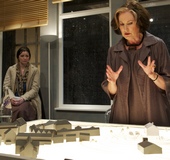SITE GUIDE
SEARCH
REVIEWS
REVIEW ARCHIVES
ADVERTISING AT CURTAINUP
FEATURES
NEWS
Etcetera and
Short Term Listings
LISTINGS
Broadway
Off-Broadway
NYC Restaurants
BOOKS and CDs
OTHER PLACES
Berkshires
London
California
New Jersey
DC
Connecticut
Philadelphia
Elsewhere
QUOTES
TKTS
PLAYWRIGHTS' ALBUMS
LETTERS TO EDITOR
FILM
LINKS
MISCELLANEOUS
Free Updates
Masthead
Writing for Us
A CurtainUp  London Review
London Review
 London Review
London ReviewLike A Fishbone
|
I will always choose God over the truth. — The Mother
|

Sarah Smart as the Mother and Deborah Findlay as the Architect (Photo: Manuel Harlan) |
Her preparations are interrupted by the arrival of a woman from this community (Sarah Smart). A blind woman, she has travelled alone by public transport to talk to the Architect whom she assumes will be a man. She claims to have had a dream in which her dead child asked her to stop the monument taking this form. And so the debate begins between the two women, stopping only for the entrances of the posh architectural intern (Phoebe Waller-Bridge) with housekeeping information and a willingness to be of assistance.
The blind woman is religious and the Architect is not, so we meet the first dichotomy of belief and non-belief or as the Architect prefers to call it, truth. The Architect talks in the jargon of her profession, about the stakeholders, in this case those paying for the monument and the families and church of those children who died at the scene. Then there is the purpose of the monument. Is it there for tourists and voyeurs who want to ogle vicariously at the place where such bloodshed occurred? The Mother knows that the outside world is asking why God allowed this to happen in their town of religious families. The Mother appeals to the Architect as a fellow parent rather than to her as a professional and to some extent this approach is effective.
Josie Rourke directs a cooly professional, but running out of patience, Deborah Findlay and driven, almost unhinged Sarah Smart as the blind mother, ruthlessly determined to change the design. The question is posed whether a memorial to a massacre can be a work of art? The Mother, increasingly desperate, challenges the Architect’s personal life, her divorce and the custody of her son with her ex-husband. Sarah Smart stares into the middle distance unsure exactly where the voices come from. Phoebe Waller-Bridge has a strong acting personality but has very little to do here.
Lucy Osborne’s wide and spacious set is dominated by the rain pouring down the windows where the Architect and the Intern talk about the importance of the function of buildings and yet, no matter how hard she tries, the Architect is unable to open the window, so this building remains oppressive and uncomfortable. An architectural model shows the school, the trees, the levels of the hill in plaster white with the grey buildings of the town below. James Farncombe’s lighting is delicate with a dramatic ending.
A parallel production will open soon in Anthony Weigh’s home country in Australia where the character of the child excised from the London script during previews will be intact.
|
Subscribe to our FREE email updates with a note from editor Elyse Sommer about additions to the website -- with main page hot links to the latest features posted at our numerous locations. To subscribe,
E-mail: esommer@curtainup.comesommer@curtainup.com
put SUBSCRIBE CURTAINUP EMAIL UPDATE in the subject line and your full name and email address in the body of the message -- if you can spare a minute, tell us how you came to CurtainUp and from what part of the country. |
| Like A Fishbone
Written by Anthony Weigh Directed by Josie Rourke Starring: Deborah Findlay, Sarah Smart, Phoebe Waller-Bridge Design: Lucy Osborne Lighting: James Farncome Sound: Emma Laxton Running time: One hour 20 minutes without an interval Box Office: 0207610 4224 Booking until 10th July 2010 Reviewed by Lizzie Loveridge based on 16th June 2010 performance at the Bush Theatre, Shepherd’s Bush Green, London W12 8QD (Tube: Shepherd’s Bush) |
|
REVIEW FEEDBACK Highlight one of the responses below and click "copy" or"CTRL+C"
Paste the highlighted text into the subject line (CTRL+ V): Feel free to add detailed comments in the body of the email . . . also the names and emails of any friends to whom you'd like us to forward a copy of this review. |
|
London Theatre Tickets Lion King Tickets Billy Elliot Tickets Mighty Boosh Tickets Mamma Mia Tickets We Will Rock You Tickets Theatre Tickets |




